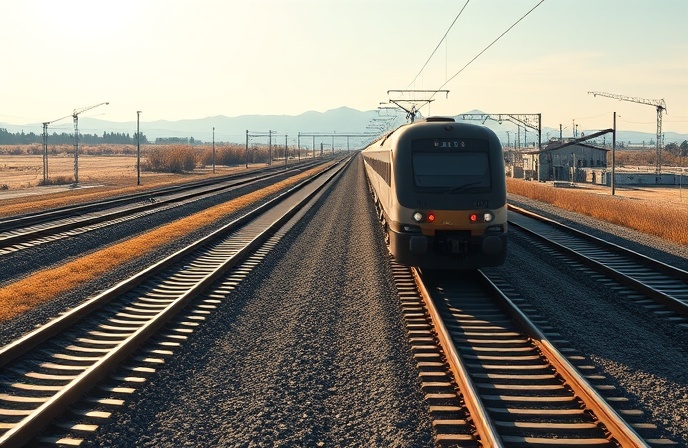Etihad Rail Expands: Hitachi’s $435M UAE Rail Deal

This article delves into the significant expansion of the Etihad Rail network in the United Arab Emirates (UAE), focusing on the substantial contract awarded to Hitachi Rail STS for the second phase of its development. The project, a crucial element of the UAE’s infrastructure modernization, represents a considerable investment in advanced railway technology and underscores the nation’s commitment to building a robust and interconnected national transportation system. This expansion will not only enhance freight capabilities, facilitating efficient movement of goods across the emirates, but also significantly improve passenger transport options, promoting economic growth and societal connectivity. We will explore the technological advancements incorporated into this phase, the logistical challenges overcome, and the broader implications of this ambitious railway undertaking for the UAE’s economic and social landscape. The strategic partnerships involved, particularly the collaboration with Hitachi Rail STS, will be examined to highlight the international expertise harnessed to realize this vision.
Hitachi Rail STS Secures Major Contract
Etihad Rail, the UAE’s national railway network, awarded a substantial AED 1.6 billion ($435.5 million) contract to Hitachi Rail STS for the systems integration and implementation of Stage Two of its ambitious railway project. This phase involves constructing a 605km rail link connecting Ghuweifat, on the Saudi Arabian border, to Fujairah on the east coast. This contract signifies Hitachi Rail STS’s pivotal role in the project’s success, encompassing the design, construction, and testing of various subsystems, including the power distribution network and signaling systems.
Technological Advancements and System Integration
The project incorporates cutting-edge railway technology. The 800km power distribution network, operating at 11kV (kilovolts), will be the longest in the UAE. The network will integrate the European Train Control System (ETCS) Level 2, enabling seamless cross-border operations within the Gulf Cooperation Council (GCC) region. This sophisticated signaling system enhances safety and efficiency by allowing for automated train control and optimized train spacing. Furthermore, the trains will be equipped with a Crisis Management Unit (CMU), facilitating direct communication with emergency services such as police and civil defense during critical situations. The operational control centers, strategically located at Faya and Mirfa, will leverage advanced communications and monitoring technologies to manage and oversee the entire network.
Operational Efficiency and Security Measures
Beyond technological advancements, Etihad Rail is prioritizing operational efficiency and robust security measures. The implementation of ETCS Level 2 contributes significantly to improved operational efficiency through optimized train scheduling and reduced delays. Security is paramount; the network will integrate a comprehensive camera system and collaborate with police departments across all seven emirates to ensure the safety and security of passengers and freight. These measures demonstrate a strong commitment to providing a secure and reliable railway service.
Broader Economic and Social Implications
The Etihad Rail project extends far beyond simply constructing a railway line; it represents a strategic investment in the UAE’s future. The enhanced freight capacity will streamline the movement of goods, boosting economic activity and reducing transportation costs. The improved passenger transport options will enhance connectivity between emirates, promoting tourism and facilitating easier movement of people. The project also fosters technological advancement and creates numerous job opportunities, contributing to the UAE’s overall economic development. The strategic partnership with Hitachi Rail STS underscores the UAE’s commitment to leveraging international expertise to build a world-class railway network.
Conclusions
The expansion of the Etihad Rail network, particularly Stage Two’s development, showcases the UAE’s commitment to modernizing its infrastructure and establishing a robust, technologically advanced transportation system. The AED 1.6 billion contract awarded to Hitachi Rail STS highlights the scale of this ambition and the importance of international collaboration in realizing this vision. The incorporation of cutting-edge technologies, such as ETCS Level 2 and the extensive 11kV power distribution network, ensures enhanced safety, efficiency, and interoperability within the GCC region. The emphasis on robust security measures, including integrated camera systems and collaborations with local law enforcement, underscores a dedication to passenger and freight safety. Beyond the technical aspects, the project’s broader economic and social implications are significant. It promises improved freight transport, stimulating economic growth and reducing logistical costs; enhanced passenger transport, improving connectivity and accessibility across the emirates; and the creation of numerous employment opportunities. In conclusion, the Etihad Rail project signifies a strategic investment in the UAE’s future, promising substantial economic benefits, enhanced social connectivity, and the establishment of a world-class railway system that stands as a testament to the nation’s forward-thinking infrastructure development strategy. The project’s success will not only benefit the UAE but also serve as a model for other nations seeking to modernize their transportation networks.




